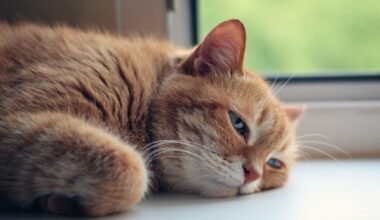Medications Commonly Used in Feline Congestive Heart Failure
Feline Congestive Heart Failure (CHF) is a serious condition that requires proper management to enhance the quality of life for affected cats. The medical approach typically consists of a combination of lifestyle changes, dietary modifications, and medications. Key drugs fall into several categories including diuretics, ACE inhibitors, and beta-blockers, each serving a unique purpose. Diuretics are crucial for eliminating excess fluid accumulation that contributes to breathing difficulties. They effectively reduce fluid levels and relieve associated symptoms, thus improving heart efficiency. Most commonly prescribed diuretics include furosemide, which is known to act quickly, alleviating signs of congestion significantly. Veterinarians often adjust dosages to maintain optimal results without side effects. This careful titration is essential for managing CHF. Ongoing monitoring by a veterinary professional is vital for ensuring the effectiveness of the treatment plan, as individual responses can vary widely among different cats. Through a collaborative approach, pet owners and veterinarians can optimize heart function and promote longevity. Understanding the specific medications available is key to effectively managing feline CHF.
One of the most common medications used for managing Feline Congestive Heart Failure is an ACE inhibitor, which works by relaxing blood vessels, making it easier for the heart to pump blood. Beneficial effects include decreased workload on the heart and improved circulation. Enalapril is a widely utilized ACE inhibitor in veterinary medicine, known for its safety profile and effectiveness. It’s vital for cat owners to recognize the significant role that diuretics and ACE inhibitors play in the treatment process, as they help mitigate the symptoms associated with heart disease. Another critical class of medications is beta-blockers, including carvedilol and atenolol. These drugs function to lower heart rate and blood pressure, contributing to improved heart muscle function. The veterinarian will determine the specific need for these medications on a case-by-case basis. Monitoring parameters such as blood pressure and heart rate is critical to ensure that therapy is both effective and safe. While medications are essential, a comprehensive approach also includes regular veterinary checkups and adjusting the treatment strategy as needed, ensuring the best outcomes possible for any affected feline companion.
Additional Supportive Treatments
Beyond standard medications, there are additional treatments available to support felines diagnosed with CHF. Supplements such as omega-3 fatty acids may also be beneficial in promoting heart health and managing inflammation. These fatty acids help to improve circulation and reduce the risk of clot formation, which can complicate heart disease. Pet owners can introduce omega-3 fatty acids into their cats’ diets through various sources, including fish oil or specially formulated cat food. Additionally, taurine supplementation has been shown to be beneficial for cats, particularly if there’s a deficiency present. It is vital to consult with a veterinarian before introducing any supplements, as dosage and necessity can vary greatly among individual cats. Providing a heart-healthy diet helps manage weight and overall well-being. Regular physical activity, under professional guidance, can also play a fundamental role. It’s essential to balance rest and exercise to avoid undue stress on the heart. Fostering an environment that minimizes stressors will ultimately contribute to better health outcomes for cats suffering from CHF. Supporting overall wellness is just as crucial as medication adherence.
Overall, pet owners play a crucial role in managing Feline Congestive Heart Failure effectively. This requires commitment to monitoring their cats for any changes in behavior or physical condition. Noticing things early can allow for timely interventions, potentially preventing hospitalizations. Regular veterinary checkups are vital to track heart function and adapt medication regimes as necessary. Careful observation can help catch signs such as coughing, lethargy, or rapid breathing, which may indicate progression of the disease. Additionally, maintaining an open line of communication with the veterinarian about any concerns, questions, or changes is essential. Consistent medication administration and following the veterinarian’s recommendations play critical roles in treatment success. Pet owners should use medication reminders or tools that make it easier to adhere to prescribed regimens. This ensures doses are administered consistently and accurately. Diet management and environmental considerations also form a significant part of a holistic approach to treatment. By creating a calm living environment with a nutritional diet tailored to their specific needs, pet owners can aid in stabilizing their cat’s condition. This proactive engagement contributes positively toward their feline companions’ health outcomes.
Potential Side Effects of Medications
Understanding potential side effects of medications for Feline Congestive Heart Failure is paramount for pet owners. While many medications exhibit favorable outcomes, some may cause adverse effects that warrant attention. Common reactions can include gastrointestinal upset, lethargy, or changes in behavior. It is prudent for owners to watch for these symptoms and communicate them to the veterinarian, who may adjust medications accordingly. Certain cats may also exhibit hypersensitivity to medications, leading to more serious complications. The veterinarian will evaluate such concerns to determine appropriate alternatives or dosage adjustments. Regular blood tests can help monitor kidney function and electrolyte levels, especially when diuretics are involved. This monitoring is invaluable to avoid complications related to dehydration or electrolyte imbalances. Owners should also question their veterinarians regarding any long-term impacts of medications, including liver effects or renal concerns. As guidelines evolve and new medications enter the marketplace, it’s important for veterinarians to stay updated. By engaging in regular discussions regarding their cat’s treatment, pet owners can foster a collaborative environment to address any concerns. This proactive approach ultimately supports optimal health and well-being for affected felines.
In summary, effectively managing Feline Congestive Heart Failure encompasses a multifaceted approach that includes a combination of medications, supportive treatments, lifestyle changes, and active participation from the owner. Critical medications such as diuretics, ACE inhibitors, and beta-blockers offer invaluable assistance in managing the symptoms associated with CHF. The role of periodic veterinary evaluations for monitoring treatment efficacy cannot be understated. Furthermore, understanding medications’ side effects and how they interact with other treatments sharpens the owners’ knowledge. Through clear communication with veterinary professionals, owners can ensure the best possible outcomes for their feline companions. Nutrition plays a pivotal role, contributing to overall health and aiding recovery. Integrating supplements like omega-3 fatty acids or taurine can also enhance the treatment plan, increasing overall efficacy. Regular exercise tailored to individual capabilities can help improve quality of life. By being informed and dedicated, pet owners can significantly influence their cats’ health journeys. Keeping a proactive approach to care can lead to greater assurance, establishing a bond of trust and security for both the owner and the feline friend. Ultimately, a joint effort between owner and veterinarian offers the solid foundation needed for successfully managing CHF.
Conclusion and Future Insights
As research evolves, new treatments for Feline Congestive Heart Failure may soon emerge. This ongoing development promises better options and strategies for managing this complex condition effectively. Keeping abreast of medical advancements in the veterinary field will empower pet owners with more tools to aid their cats. Engaging in discussions with veterinarians about the latest drug approvals or treatment protocols will help navigate these changes. Educating oneself about veterinary cardiology can help owners ask informed questions, which fosters better decision-making. Additionally, exploring the latest findings via reputable veterinary publications or conferences can contribute to a deeper understanding of feline heart conditions. With an optimistic outlook towards improving feline heart health, pet owners should remain vigilant about their cats’ health. Early diagnosis continues to prove beneficial when it comes to managing CHF, paving the way for more effective interventions. Supportive organizations and breed associations often provide valuable resources related to feline health issues, among other support avenues. These insights collectively serve as a reassurance for pet owners seeking the best for their feline partners. Ultimately, collaboration in care cannot be stressed enough as it leads to happier and healthier lives for affected cats.
In conclusion, the management of Feline Congestive Heart Failure is a multifaceted endeavor requiring commitment from both pet owners and veterinary professionals. Adopting a proactive approach, including a thorough understanding of medications, regular checkups, and lifestyle adaptations, ensures that cats receive optimal care. The balance of medication, nutrition, and emotional support creates a nurturing environment for feline companions coping with this challenging condition. Future developments in veterinary medicine augur well for enhancing treatment modalities and improving outcomes for heart-affected felines. Continuous engagement between owners and veterinarians fosters a unified approach, ensuring that the needs of cats are met throughout their treatment. Overall, providing a structured support system and informed knowledge significantly improves the well-being of these beloved pets, making management feasible and effective. Together, we can look forward to an era where cats with CHF have the best possible chances for a healthy and fulfilling life.


